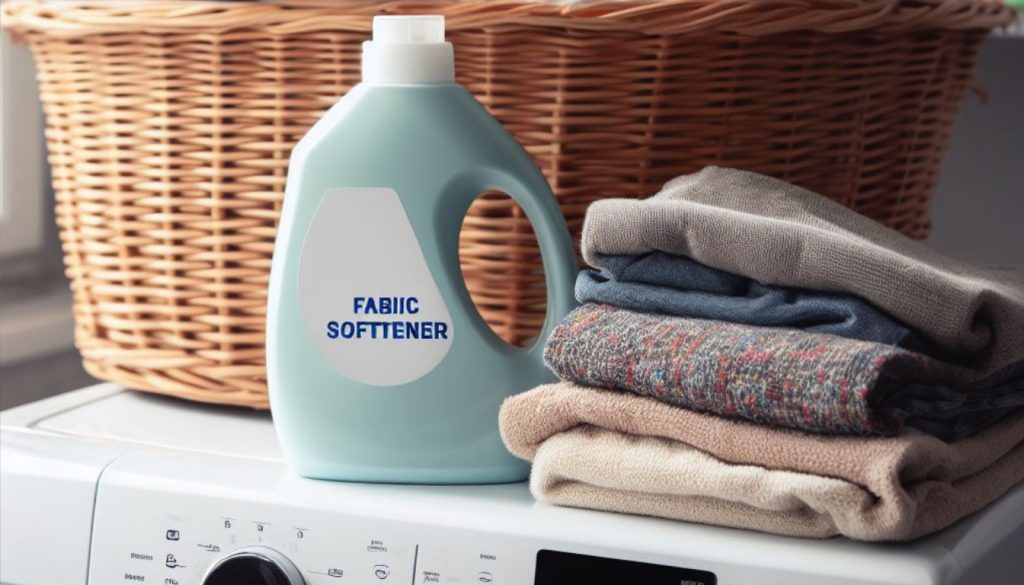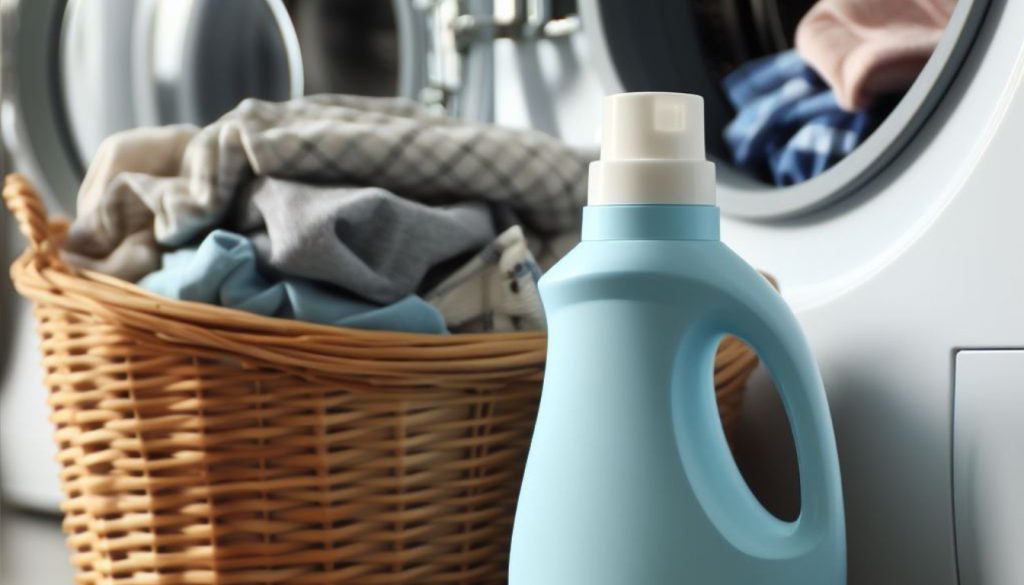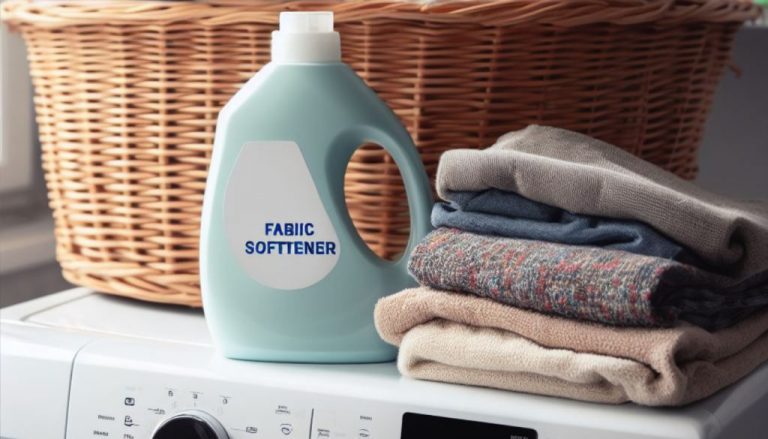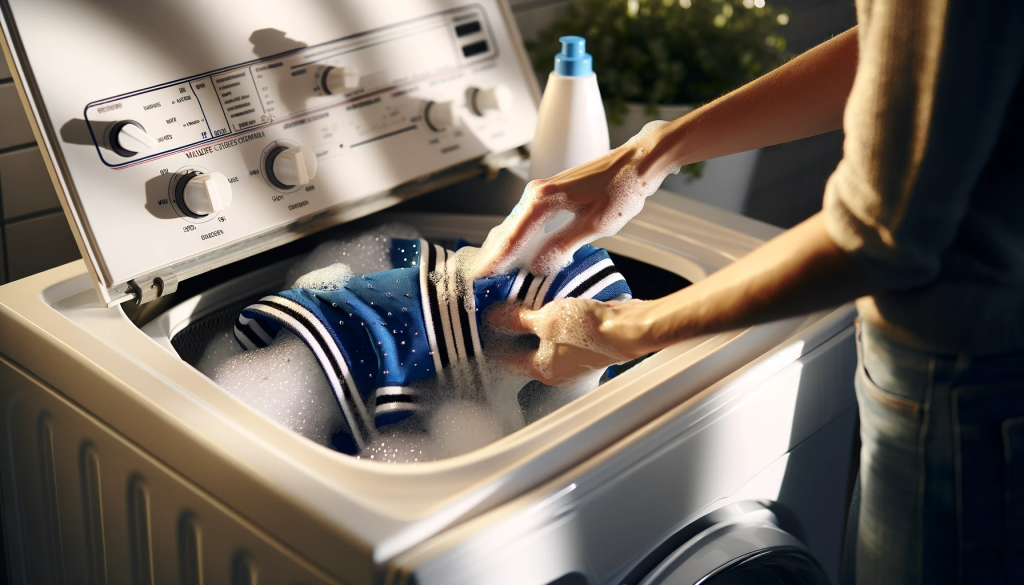Discover the hidden magic behind fabric softeners and why they are essential for your laundry routine. From reducing static cling to enhancing softness, this laundry aid does wonders that go beyond just a pleasant scent. Explore the world of fabric care with us and find unique fabric-themed products at InktasticMerch.
While laundry might seem straightforward, have you ever pondered the actual function of fabric softener? It offers more than a fresh fragrance. This blog post unravels the mystique of fabric softeners, revealing how they work wonders on your wardrobe.
Let’s explore the secrets behind this laundry champion!
Key Takeaways
- Fabric softeners employ electrically charged compounds to coat and smooth fibers, reducing friction, static cling, and enhancing softness.
- Varieties include liquid, dryer sheets, beads/crystals, fabric softening balls, and spray-on softeners, each with its own distinct advantages.
- The perks of using fabric softeners range from softer textures, reduced static, easier ironing, to prolonged freshness and improved color retention.
- Downsides include potential fabric degradation, skin irritation, environmental side effects, residue buildup, cost, incompatibility with some detergents, allergies, and flammability risks.
- Natural substitutes for fabric softener are white vinegar, baking soda, wool dryer balls, aluminum foil, and air drying techniques.
- Key tips include measuring with care, avoiding stains, and skipping their use for certain fabrics or based on personal preferences.
What is Fabric Softener?
Fabric softener is a versatile laundry aid available in liquid, powder, and sheet forms, designed to enhance fabric softness and reduce wrinkles.
Types of fabric softener (liquid, powder, sheets, etc.)
A variety of fabric softeners exist, each offering its own set of benefits.
- Liquid Softeners: Introduce these into the final rinse cycle to soften fabrics while infusing a refreshing scent.
- Dryer Sheets: Easy to use, they prevent static cling and impart a subtle fragrance when added to the dryer.
- Beads or Crystals:These dissolve slowly when sprinkled in the washing machine, releasing their aroma throughout the wash.
- Fabric Softening Balls:Reusable and placed in the dryer, they soften laundry by gently massaging fabrics during the tumble.
- Spray-on Softeners: Ideal for a quick freshen-up post-wash, spray directly onto clothes before ironing.
How Does Fabric Softener Work?

Fabric softener uses electrically charged compounds to coat the fibers in your clothing, making them softer while cutting down on static. Interested in the details of this process? Continue exploring!
Electrically charged compounds
Fabric softeners harness the power of electrically charged compounds that are ingeniously designed. Carrying a positive charge, these compounds counteract the negative charges in fabrics responsible for static.
During the rinse cycle, the compounds adhere to the fibers, forming a protective layer. This lessens friction and results in softer clothing. With a diminished electrical charge, static cling is also reduced – say goodbye to socks sticking together mysteriously! Additionally, the compounds contribute a fresh aroma, enhancing your laundry experience.
Achieve laundry that’s not just soft to the touch but delightfully fragrant, too.
Smoothing and Coating Fibers
Fabric softeners play an essential role in the laundry routine by smoothing and protecting fibers. As the washing machine operates, these agents are unleashed into the water, promptly attaching themselves to the fabric strands, thus providing a safeguard to each thread.
This process minimizes the friction that could cause wear and tear during wash or drying cycles, while also evening out any rough texture on the surface of the fibers.
This results in wonderfully soft clothing that feels great, while boosting their longevity over time.
The Pros and Cons of Using Fabric Softener
Fabric softener comes with advantages like softer textiles and reduced static, but it’s not without its downsides, such as potential fabric damage and skin sensitivity. Intrigued? Continue reading!
Benefits (Softer Fabrics, Reducing Static, etc.)
Fabric softener provides multiple advantages for your laundry:
- Softer fabrics: This product helps to ease stiffness, ensuring that clothes feel soft and cozy against your body.
- Static reduction: Combat annoying static cling as fabric softeners balance the electric charges in clothing to prevent them from sticking to one another.
- Easier ironing: It facilitates ironing by diminishing wrinkles and increasing fabric pliability.
- Enhanced freshness: The lingering pleasant scent of fabric softeners keeps your garments smelling fresh and clean.
- Color protection: By forming a coating on fabric fibers, softeners maintain the vibrancy of colors, slowing down the fading process.
- Reduced roughness: Certain softeners can diminish the harshness of specific materials, giving them a smoother touch.
Drawbacks (Damage to Certain Fabrics, Skin Irritation, etc.)
Fabric softeners may not be ideal for every type of fabric or person. Understanding the potential disadvantages is crucial. These include:
- Fabric damage: Fabrics like towels and athletic gear could suffer from softener use as the chemicals might diminish absorbency or affect moisture-wicking attributes.
- Skin irritation: The fragrances and chemicals in fabric softeners might provoke reactions in those with sensitive skin, leading to itching or rashes.
- Environmental concerns: Some components in softeners can be environmentally damaging, polluting water and harming marine life.
- Residue accumulation: Over time, softeners can leave deposits on clothing and in washing machines, contributing to stiffness, grease-like textures, and accelerated color fading.
- Expense: Incorporating fabric softeners into your laundry routine can increase costs, depending on type and usage frequency.
- Detergent compatibility: Certain softeners might not work well with specific detergents or washing machine settings.
- Allergic reactions: Fragrances in softeners can trigger allergic or asthmatic reactions in sensitive individuals.
- Flammability risks:
Be cautious, as some liquid fabric softeners can catch fire.
Alternatives to Fabric Softeners

Looking for natural ways to soften your laundry? Try alternatives like vinegar and baking soda to cut static and improve softness. Curious about more options? Read on!
Natural Alternatives
If you want to skip the fabric softener, explore these natural solutions for softer, static-free clothes without relying on standard fabric softeners. Consider these possibilities:
- White vinegar: Pour 1/2 cup into the rinse cycle to soften fabrics and minimize static.
- Baking soda: Add 1/4 cup to your wash to naturally freshen and soften your clothing.
- Wool dryer balls: Toss these reusable balls in the dryer to reduce static and wrinkles while softening your laundry.
- Aluminum foil: Crumple foil into a ball and place it in the dryer to combat static cling.
- Air drying: Opt for line drying to naturally soften fabrics without a dryer.
Tips for Reducing Static and Achieving Softer Clothes Without Fabric Softener
Here are some easy ways to counter static and make your clothes softer sans fabric softener:
- Vinegar magic: Use half a cup of white vinegar in the rinse cycle to soften and reduce static.
- Power of dryer balls: Add dryer balls to the dryer; they help reduce static and fluff fabrics.
- Line dry: Choose to air dry clothes outside or on a rack to cut static and add natural softness.
- Give a good shake: Shake garments to release static and add a soft touch.
- Go natural: Use baking soda or essential oils for natural softness and scent.
Tips for Using Fabric Softener
Carefully measure fabric softener to avoid stains and don’t use it for certain fabrics. Uncover more tips for softer clothes without it in our blog.
Proper Measurement
For optimal results, following precise measurements when applying fabric softener is essential. Adhere to the guidelines on the packaging to find the right dose for your laundry size.
Excess can result in residue, while too little might not deliver the desired softness or static reduction. By measuring accurately, you enjoy perfectly softened and fresh clothes seamlessly.
Avoiding Staining
Prevent staining with fabric softener by observing a few steps. Firstly, adhere to the exact measurements stated on the packaging.
Too much product may leave unwanted residue that could stain your clothes. Additionally, ensure that you pour it directly into the designated compartment.
dispense it during the rinse cycle, ensuring it doesn’t come into direct contact with fabrics prior to thorough rinsing.
If, after washing and drying, you spot any lingering stains, consider rewashing your clothes sans fabric softener or pre-treating the marks before laundering again. By following these guidelines, you can revel in the softness of your garments without the hassle of unwanted spots.
Optional for Certain Loads
While fabric softener can be a beneficial addition, it’s not always a must-have for every laundry load. In some cases, you can omit it without sacrificing the cleanliness or integrity of your clothes.
This is particularly relevant for fabrics like towels or sportswear, which may not benefit from softener use. Skipping it for these items can maintain their absorbency and performance over time.
If you favor a scent-free wash or have sensitive skin, steering clear of fabric softener might be the right decision for you.
Conclusion
Fabric softener revolutionizes the laundry process, employing electrically charged compounds to smooth fibers, result in a softer touch, and diminish static cling.
Despite a few downsides and alternatives, fabric softener can elevate the comfort of your clothing to new heights. So don’t hesitate—enjoy the advantages of this laundry secret weapon and experience the transformation it offers!
Explore more insightful tips and tricks for your home and lifestyle by visiting our Blog and discover how to make everyday tasks easier and more enjoyable!




